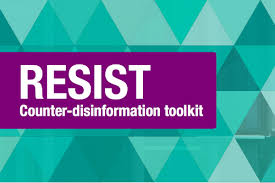 Private-sector platforms should acknowledge and embrace their own free expression right to combat political disinformation and to protect democracy, argues Eileen Donahoe (left), executive director of the Global Digital Policy Incubator at Stanford University, Cyber Policy Center, and former U.S. Ambassador to the UN Human Rights Council.
Private-sector platforms should acknowledge and embrace their own free expression right to combat political disinformation and to protect democracy, argues Eileen Donahoe (left), executive director of the Global Digital Policy Incubator at Stanford University, Cyber Policy Center, and former U.S. Ambassador to the UN Human Rights Council.
To help platforms and government policymakers better understand platform rights and responsibilities when it comes to free expression and democracy, she offers six suggestions to re-frame the debate in The American Interest:
- Freedom of expression for platform users entails more than the right to speak. It also involves the freedom to seek and receive information, as well as the freedom to form opinions. If the ability of platform users to form political opinions is distorted by rampant political disinformation, an important dimension of their free expression rights will be undermined. Commitment to users’ free expression does not require that platforms let disinformation flow, but instead justifies efforts to combat it.
 Platforms should recognize that it is within their own right to free expression to more explicitly commit themselves to protecting democracy and democratic participation, as an expression of their own values. The right to vote and participate in democracy is a fundamental right of individuals that platforms should embrace, just as they embrace free expression.
Platforms should recognize that it is within their own right to free expression to more explicitly commit themselves to protecting democracy and democratic participation, as an expression of their own values. The right to vote and participate in democracy is a fundamental right of individuals that platforms should embrace, just as they embrace free expression.- Platform rules are a manifestation of the free expression of platforms themselves, as are their powers to promote, demote, label, curate, and rank content. Platforms should not shrink from exercising these powers in the public interest, by retreating into the mistaken presumption that they are bound by the First Amendment when governing speech on their platforms. But platform powers should be exercised responsibly and much more transparently, given the substantial impacts platform discourse has on societies.
- Platforms should take an expansive view of the free expression rights of users, but also consider the impact of their platforms on the expression interests of citizens and the larger societies in which they operate. Expression of the democratic will of the people in an election is the most important manifestation of the expression of the interests of citizens. ….
- Platforms should not selectively bind themselves to the U.S. First Amendment, especially if only for the speech of elected officials. The complex interplay of expression of interests on platforms is not the same as free speech in an American public square. In fact, global platforms should be guided by internationally applicable human rights principles, including Articles 19 and 25 of the International Covenant on Civil and Political Rights. …..
- In terms of guidance to the government, the key point is that policymakers should not discourage the responsible exercise of platform rule-making authority in support of democracy. The government should develop transparency and accountability regimes that allow users and the public to assess platform consistency in the application of their own rules and guidelines, as well as the less visible aspects of content promotion and demotion policies. …..
“This is exceptionally excellent from @EileenDonahoe on the different rights in play when it comes to online disinformation,” @peterpomeranzev tweeted. “What happens when disinformation restrains your right to accurate info or your right to vote?”
The bottom line is that private-sector platforms should acknowledge and embrace their own free expression right to combat political disinformation and to protect democracy, adds Donahoe, a National Endowment for Democracy board member. RTWT







